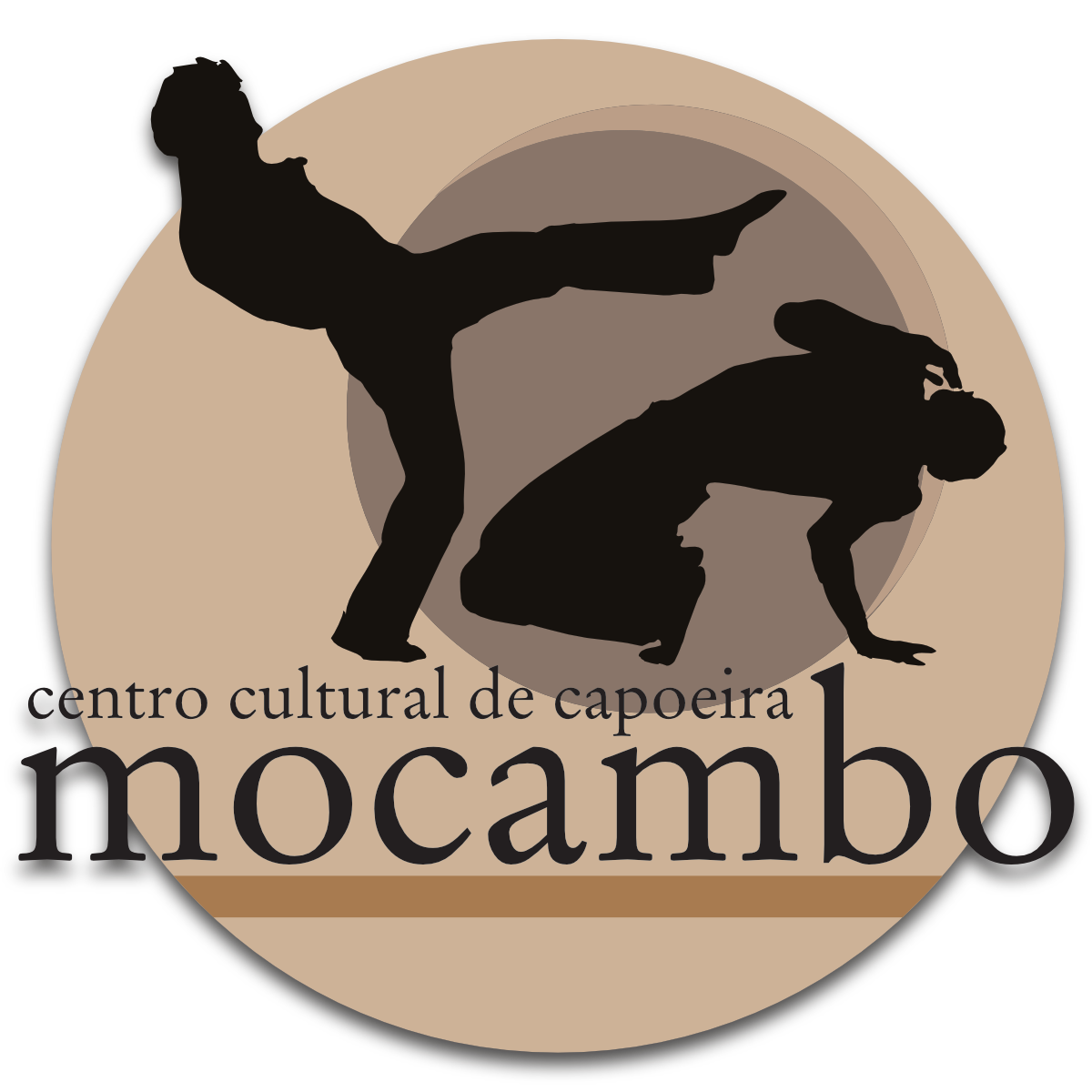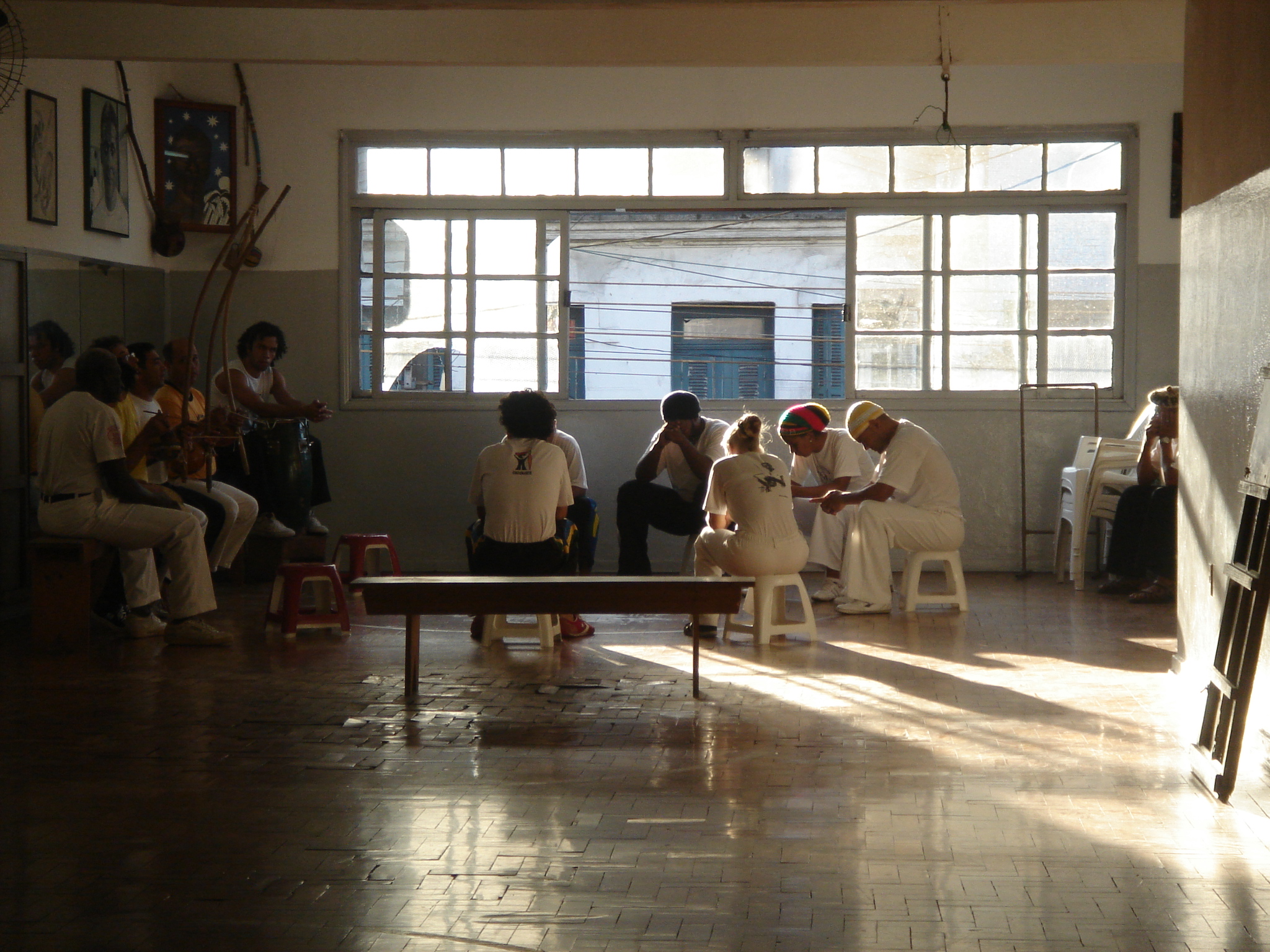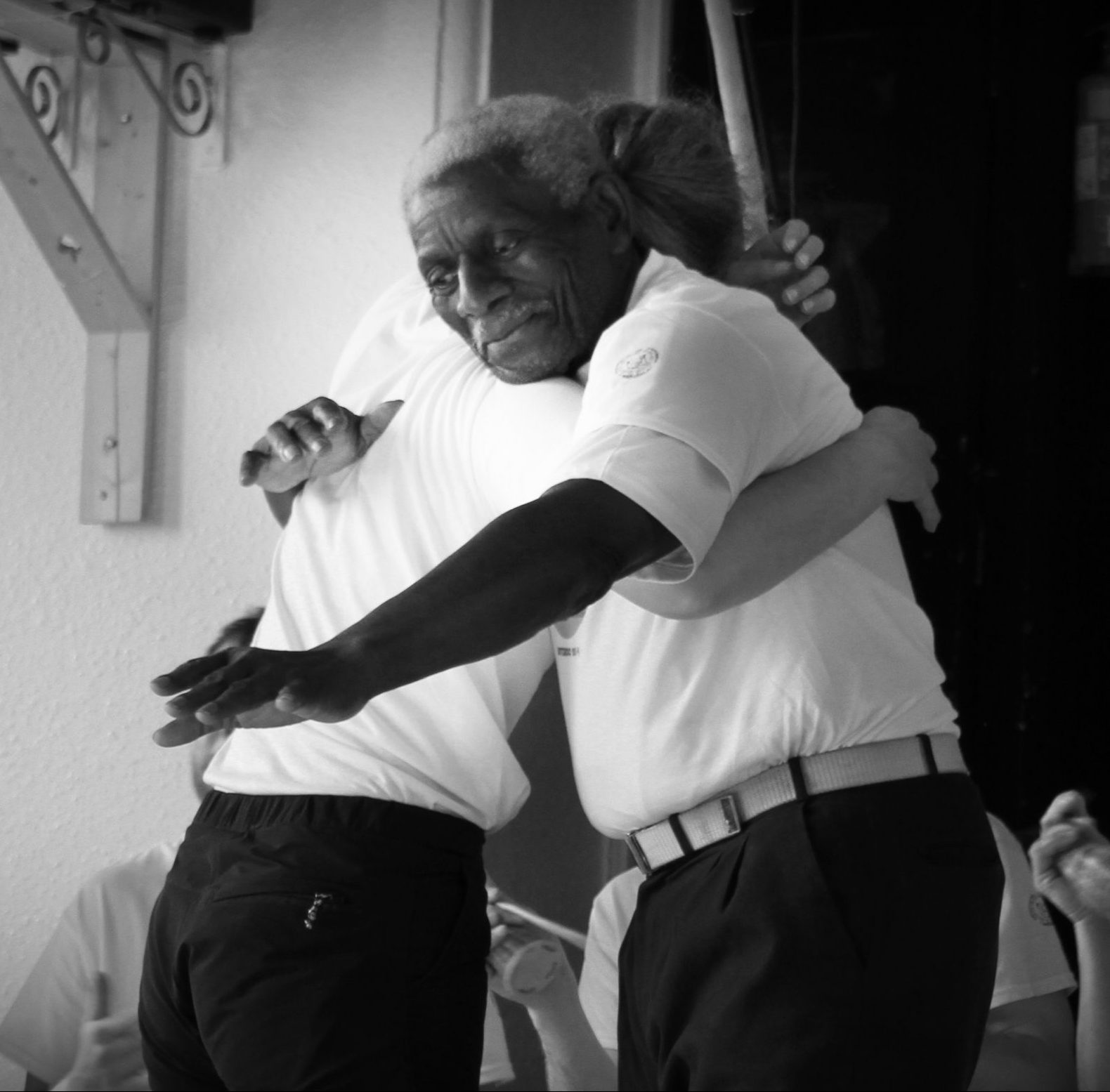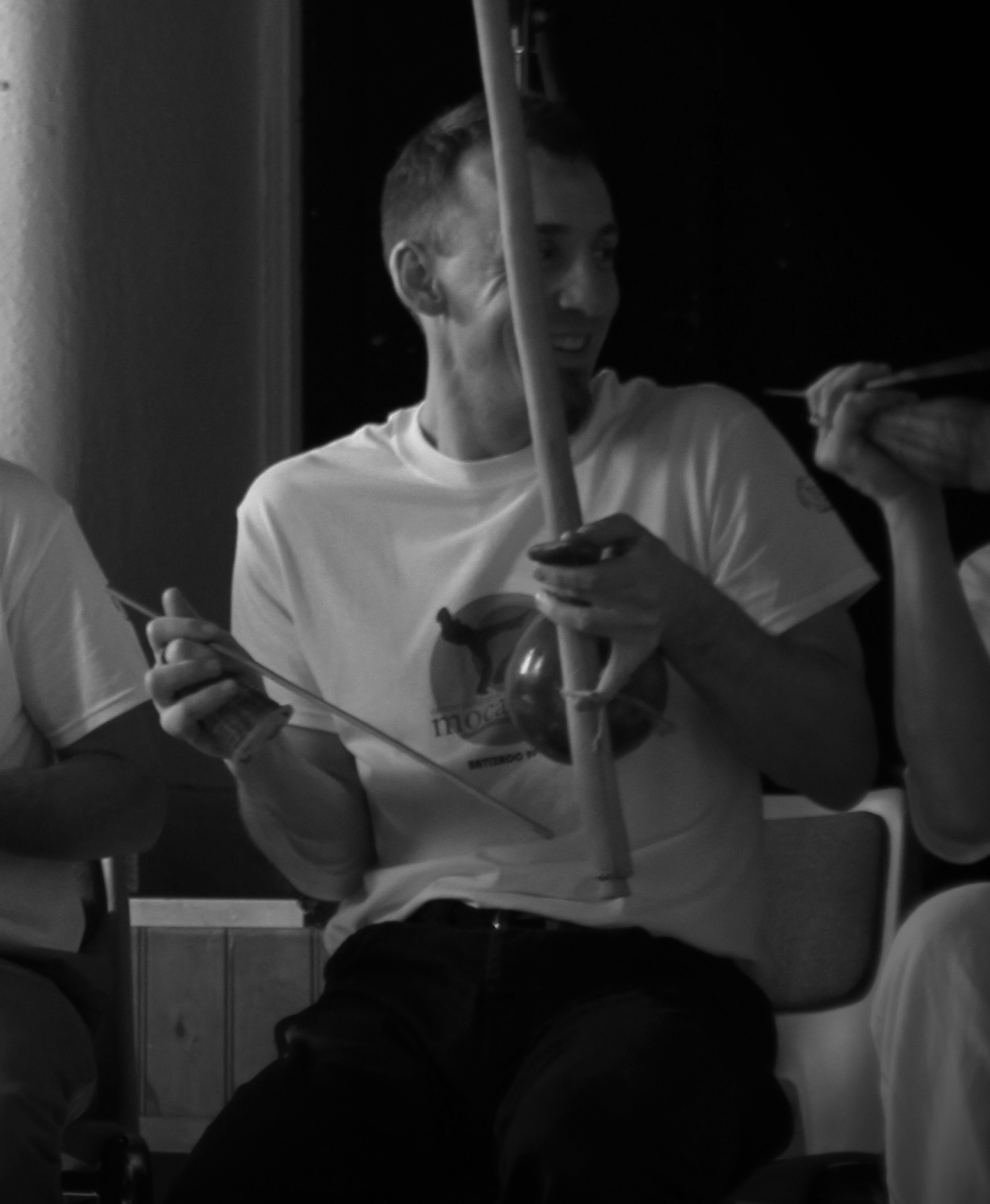Capoeira Mocambo
About The Group
Classes
Info about classes and locations
Monitor Colin
About Colin
Resources
Videos and Online Resources
Capoeira History
Capoeira is Brazilian art form which combines Dance, Music, Martial Arts and theatrical game play. It was developed from African Traditions by Africans as a tool of rebellion against their slavery in Brazil. The real intention behind the acrobatics, footwork, subtle attacks and defensive evasions was disguised from the Portuguese overseers as a ritual dance.
Brazil was discovered by the Portuguese in the year 1500, transatlantic Slavery started soon afterwards and continued legally until 1888. Approximately 6 million people were taken from their African homes and enslaved in Brazil during these 4 centuries. Capoeira, as with other expressions of African culture was made illegal with severe corporal punishment meted out for those caught in its practice.
When the law abolishing slavery in Brazil was passed, all records were burnt to prevent compensation claims. Former slaves were not provided with any new form of income, accommodation or alternative socio-economic survival.
Capoeira was finally legalised in 1937. This was largely thanks to Mestre Bimba developing a new “Regional” Capoeira which removed much of the African Ritual and focussed on more direct Martial Arts techniques and training methods. Subsequently those who wished to preserve the traditions defined their practice as “Capoeira Angola”.
Since the 1970’s there has been an explosion of styles, referred to as “Contemporanea” (Contemporary).
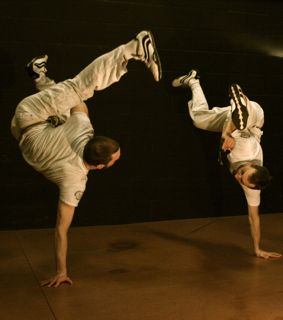
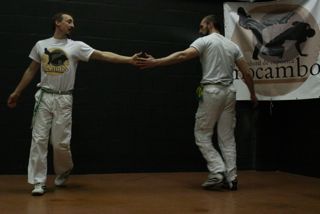
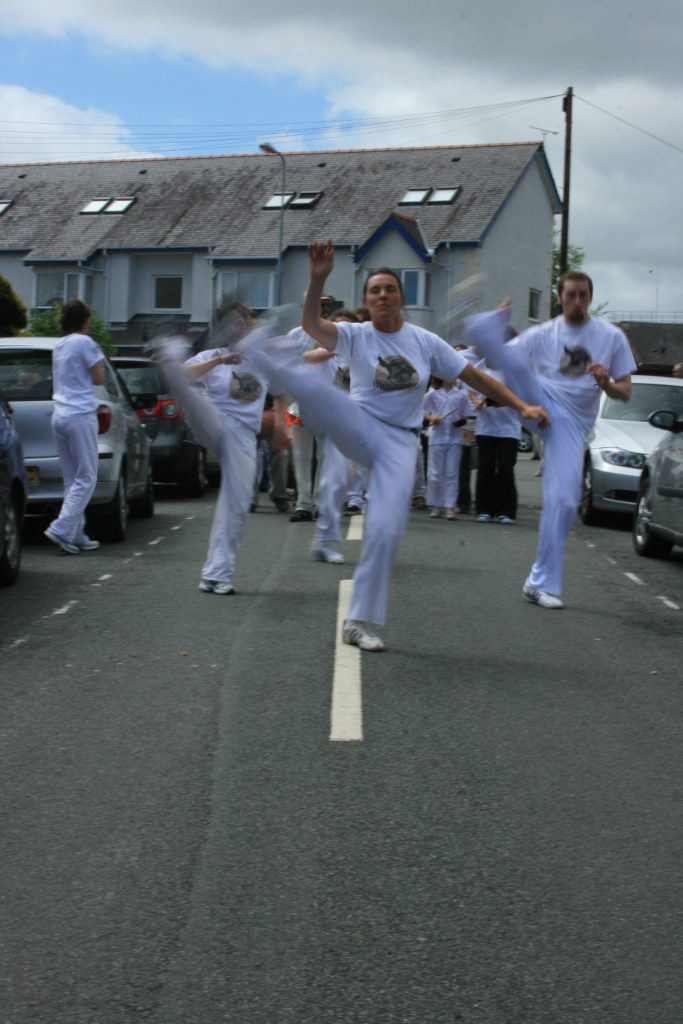
Modern Capoeira
Capoeira is a game, challenge and physical dialogue that takes place between two “Capoeiristas” in the centre of a circle (called the “Roda”). The rules, objective and speed of the game are dictated by the rhythms and songs of the other Capoeiristas around the circle (Roda).
The Capoeira orchestra is controlled by the one-stringed bow called a Berimbau, which is supported by specific percussion instruments and with particular songs sung in Portuguese.
Generally within the Game (Jogo) the Capoeiristas try and out-do each other by:
- Being more acrobatic
- Dominating the space and disrupting the natural flow of their opponents movement
- Catching their opponent unexpectedly off-balance.
Capoeira is uniquely social, it is possible to “make a level playing field” for all games no matter the difference in level or ability of the two players. Every game of Capoeira is unique and improvised.
Capoeira movement has a broad influence on Contemporary Dance, Street/Break Dance and the sport of choreographed martial arts called “Tricking”.
“Centro Cultural de Capoeira Mocambo” is affiliated with “Associaςão de Capoeira Senzala Santos”, the school of widely respected Grand Master, Mestre Sombra in Santos, São Paulo State, Brazil.
ClASSES
Evening Classes
Evening Classes are at “The Old Goods Yard” near the Antelope Pub (LL57 2HZ)
From the uphill side of the pub, take the small track that runs between the crash barrier and railway line, Stay left through the Gates into TOGY, Capoeira is the first building on the left.
(We offer discounts for families)
For further details, please contact:
Monitor Colin Daimond on 07773 798199
or email
MONDAY
Beginners & Youth
6:30-7:30pm
£7.00
WEDNESDAY
All Adults
6:30-7:30pm – £7.00
*Age 4-7
4:00pm – 4:45pm – £5.00
*Age 7-11
4.45pm – 5:30pm – £5.00
*During School Terms
Payments are made directly / electronically to our account. After a trial period, payments for children’s classes are requested up-front for each 6 week block
Mestre Sombra
Senzala Santos, Brazil
Mestre Sombra – Roberto Teles de Oliveira – was born in Santa Rosa de Lima, Sergipe State, Brazil.
He moved to the city of Santos, São Paulo state, in 1962 and joined the group Bahia do Berimbau in 1963.
“Grupo Bahia do Berimbau” was composed of the greatest capoeira’s celebrities of the time, all with origins in North East Brazil.
Guided by Master Bispo, they used to meet to practice capoeira among themselves and run Rodas in the street. Master Sombra, one of the youngest, was the last to join the group.
The group invested Master Sombra with the mission of perpetuating and divulging their knowledge, tradition and culture. In 1975 following a variety of projects, Mestre Sombra founded Associação de Capoeira Senzala de Santos, still based today at Rua Bras Cubas, n. 227, Santos, São Paulo.
The Senzala Santos academy has since graduated many prolific masters and teachers. Many of whom run their own schools in Santos and other nearby cities, and many of whom have founded schools throughout Europe and the United States.
“Senzala” was the Portuguese word for slave barracks during slavery in Brazil.
Monitor Colin Daimond
Capoeira Mocambo, Wales
Colin is a Freelance Percussionist, Movement Artist and Capoeira Teacher with 20 years experience in the Arts. Originally from North Wales he became involved in community music in 1994.
Having moved to Manchester he began training with Capoeira Norte in 1997 and qualified as “Aluno Formado” with them in 2004.
Training / Apprenticeship with Capoeira Norte included: a host of outreach and community projects; street and club performances; the opening ceremony of the Commonwealth games 2002; collaboration with Movement Artists from different disciplines within the production company “Urban Expansions” and teaching Capoeira classes at the Northern School of Contemporary Dance.
During 2005 Colin spent 6 months training under Mestre Sombra at the “Associação de Capoeira Senzala Santos” academy in Sao Paulo State, Brazil.
Colin returned to North Wales and became a Community Dance Development Practitioner for “Dawns i Bawb” and a Performer/Project Manager with the North Wales Dance Collective.
Through affiliation with Mestre Sombra and Senzala Santos Colin has been developing the practice of Capoeira within North West Wales.
“Centro Cultural de Capoeira Mocambo” was officially formed at the beginning of 2010 and runs regular Adult, Youth and Children’s Classes.
The word Mocambo was a term used to describe the settlements and exile communities established by fugitive slaves in Brazil in the 18th and 19th century. Professor Stuart .B. Schwartz states that Mu-Kambo (Mocambo) is an Ambundu word meaning hideout.
In 2010 Colin was awarded an Arts Council of Wales training grant to help develop and diversify his own Capoeira skills. During part of his trip to Brazil, Colin was made “Monitor” (2nd level teacher) by Mestre Sombra.
Media
Regular Classes
At Penrhyn Castle
Connecting Strings
TRAINING RESOURCES
More coming Soon!
Phone
07773 798199
info@capoeiramocambo.co.uk
